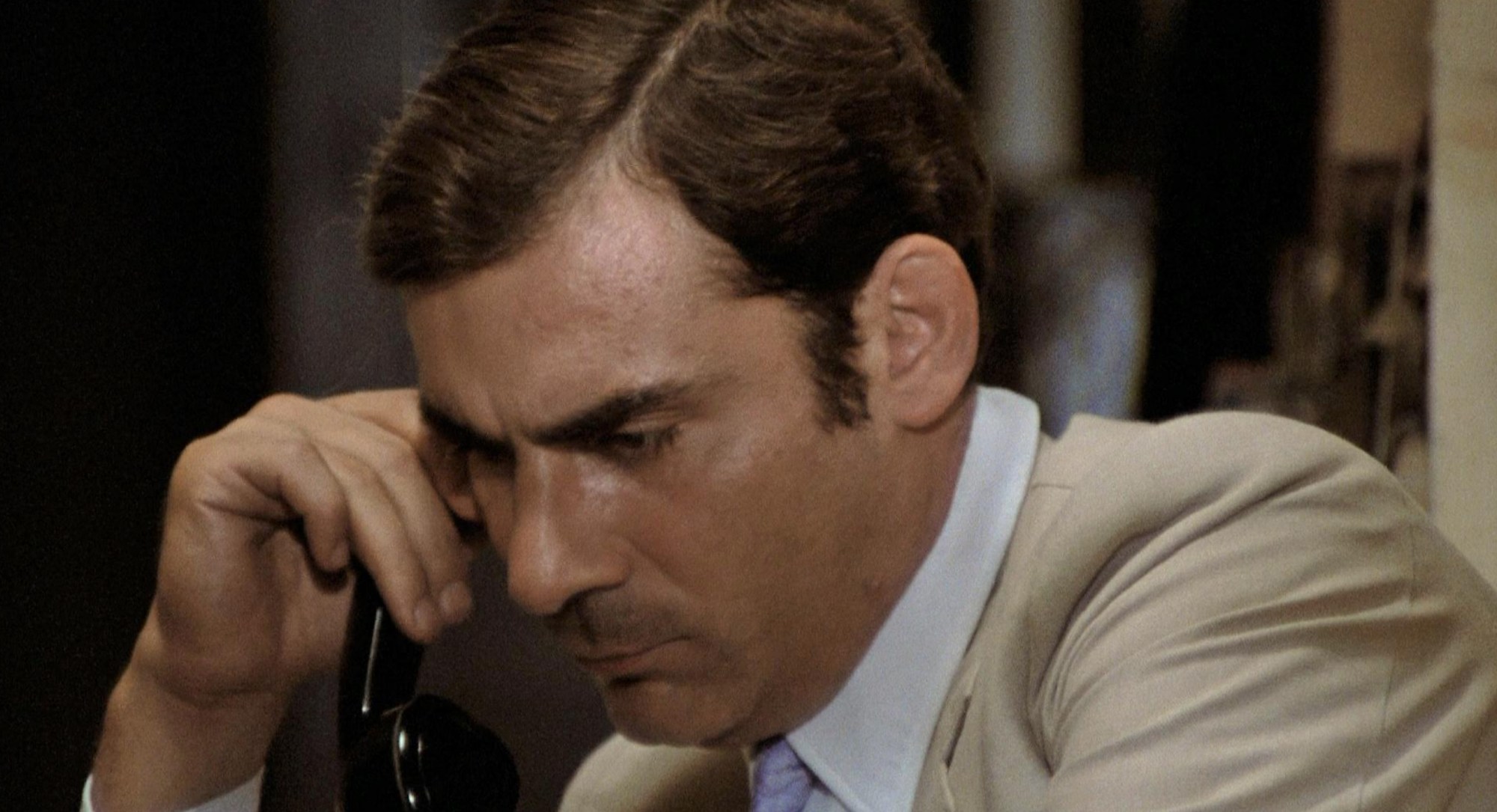
- HFPA
Restored by HFPA: “Investigation of a Citizen Above Suspicion” (1970)
In the 1970s, Italian film Investigation of a Citizen Above Suspicion (Indagine su un cittadino al di sopra di ogni sospetto), a police chief kills his kinky mistress while they are making love, then leaves clues of his guilt, daring his colleagues to charge him with the crime.
Gian Maria Volontè, in his most famous role as the nameless chief of the homicide division of Rome’s police force, is a charismatic sociopath driven to crack down on the anarchists participating in the riots roiling Rome. At the same time, he is a conscienceless murderer testing the corruption of the police department he heads, investigating the crime he himself has committed. The film is directed by Elio Petri, a pioneer in the genre of political cinema in Italy.
Petri’s purpose is to shine a light on the authoritarian methods of the police as well as to create a psychological study of his lead character, whose motivations are only revealed in time.
The relationship with the mistress (Florinda Bolkan) is particularly twisted. He photographs her posing as a victim in various crimes under his investigation. But there is something he is not aware of: she is having a torrid affair with an “individualist anarchist” (played by Sergio Tramonti).
Promoted to the Political Intelligence Department, where he is charged with controlling the anarchists and communists, Volonte initiates a major wiretapping operation to entrap the rebels and interrogate them. “Repression is our vaccine!”, he thunders at one point.
He also meddles in the murder investigation, pointing out to his colleagues all the clues he has left at the murder scene, only to see them come up with excuse after excuse to ignore his culpability – despite the fact that he has left bloody footprints, fibers from his tie, and even a taped confession. He is the law, therefore he is above it. In fact, the film ends with a quote from Kafka’s “The Trial” – “Whatever impression he makes on us, he is a servant of the law, so he belongs to the law and escapes human judgment.”
The charismatic Volonte is a master actor. His performance runs the gamut, from screaming fascist to cringing supplicant. He owns every scene he is in. Through the manipulation of innocents, he proves he is above suspicion. The beautiful Bolkan is the temptress who lures men to their doom as she succumbs to one, having pushed him too far.
In his political films, director Petri was commenting on the times he found himself in. The Italian government was covertly funding cultural tensions so that they could be violently put down. With that, the police proved to the public the need for authoritarian tactics and blamed the rebels for the unrest.
As a youth, Petri coordinated cultural activities for the Italian communist party and was a film critic for the Communist daily L’Unità. He left the party in 1956 but his sympathies were always with the working class. His despair with socio-political inequalities was very much apparent in the three works he directed after Investigation.
In 1971 he made The Working Class Goes to Heaven (released in the United States with the title Lulu the Tool), about labor unions and the condition of factory workers. His following film, Property is No Longer a Theft, released in 1973, is about a small-time crook being seduced by money and power. In Todo Modo, from 1976, Petri exposes the power structure and corruption of a political party. Volonte starred in two of them, working with Petri a total of four times.
Volonte was best known in the US for his work in Spaghetti westerns (two with Sergio Leone and Clint Eastwood), but he was a stage-trained actor and one of the most celebrated in Italy in the 1970s. Investigation made him an international star. His father was a fascist but Volonte joined the Italian Communist Party and never denied his leftist sympathies. He also ran for office in 1992, as a candidate from the Democratic Party of the Left.
The Brazilian-born Bolkan moved to Italy when she was discovered by Luchino Visconti. She made her career in Italy acting in more than 40 films. Bolkan has won the Donatella award three times. She continues to act, most recently in the 2020 film Magari.
Investigation is scored by Ennio Morricone, who revealed in a posthumous documentary that Petri played a practical joke by showing him an edit of the film with a different score, then apologized profusely at his distressed reaction by saying “You’ve composed the best score ever, you should punch me in the face for pulling a stunt like this!”
Investigation was well received by critics and audiences alike. When it opened in Italy, long lines formed outside cinemas. Midnight screenings were scheduled to accommodate the surprising number of fans. The film won the Oscar for Best Foreign Language Film. Petri and co-writer Ugo Pirro were both nominated for Best Screenplay. It also won the Jury Prize at the Cannes Film Festival. Volonte won Best Actor at the Donatello Awards (the Italian equivalent of the Oscars).
A couple of attempts at remaking the film in English went nowhere. One was to be written by Paul Schrader, starring either Al Pacino or Christopher Walken. The other was when Jodie Foster’s production company attached Sidney Lumet to direct a version in the 1990s.
Investigation of a Citizen Above Suspicion has now been restored in 4K by Colorworks in collaboration with Cineteca di Bologna at L’Immagine Ritrovata. Funding was provided by the Hollywood Foreign Press Association, The Film Foundation, and Sony Pictures Entertainment.